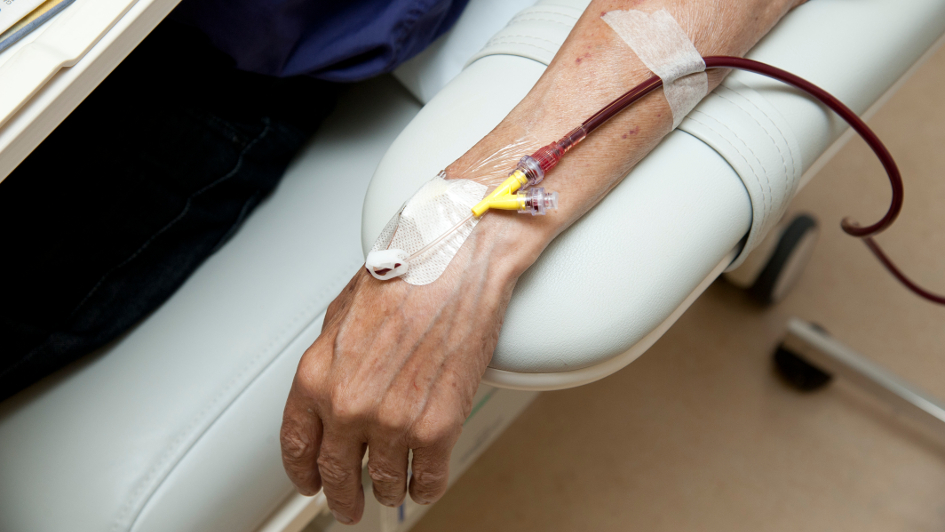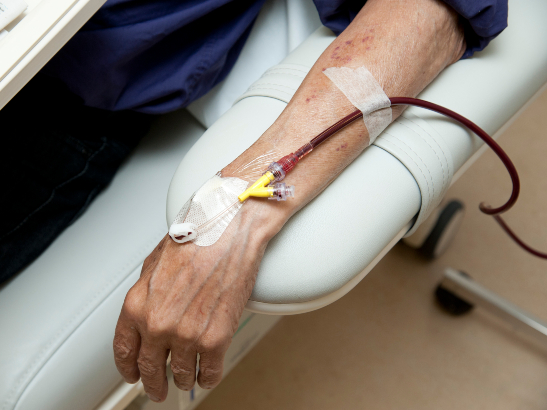
This week we mark one year since the UK went into lockdown. After an extremely difficult twelve months, there is light at the end of the tunnel. Spring is on its way, the vaccines are working, and cases of Covid-19 continue to fall.
But as the immediate threat of Covid-19 overwhelming our healthcare system recedes, the impact of a seriously limited health service for cancer patients becomes increasingly clear.
Recently, Professor Clare Turnbull from The Institute of Cancer Research joined an expert panel, hosted by the Royal Society of Medicine, to take stock of the situation, reflect on the past year and discuss what we’ve learnt. Here is what we took from the discussion.
Delayed diagnosis and screening has been a big issue
The past year has seen a drop in the number of patients being diagnosed with cancer, and many patients have been diagnosed with cancer at a more advanced stage. The panel expects that over the next year or so we will be dealing with these patients as they come in, on top of the treatment backlog and regular rates of diagnosis.
Professor Turnbull commented: “It does seem that overall the data point to the fact that actually, the ‘stay home and don't trouble the NHS’ message has been very effective and people with non-specific symptoms may have been sitting on them longer.”
Delayed diagnosis means trickier surgery
Patients who have been scared to visit their GP or go to the hospital, are presenting later, with worse symptoms and more advanced cancer which may be more difficult to treat.
Professor Neil Mortensen, President of the Royal College of Surgeons, commented: “This whole business of what we might call ‘upstaging’ is concerning. Not only will there be the delay, but the delay will have an effect on the surgery, so the tumours will be more advanced, they'll be more difficult to take out.”
Patients with established cancer have been hit hardest by increased surgical waits
Surgical wait times are now less pronounced for patients with a first diagnosis of cancer but there are sizable waits for people where it is not their first cancer presentation.
Professor Turnbull said: “These are patients who, whilst their cancer is not curable, can often be well managed for months, if not years. However, these life-extending treatments are being very sizably delayed.”
Delivering treatment is safe
In March, the northern Italian region of Lombardy became the global epicentre of the coronavirus. According to Professor Turnbull, early data from both Wuhan and Lombardy put the ‘fear of god’ into a lot of cancer clinicians about how for cancer patients the risks of death from Covid-19 if infected should be balanced with the benefits of treatment.
Early on, patients with disease were warned to stay away from the hospital. Many doctors worried that immunosuppression from chemotherapy and immune changes with immunotherapies could put patients at much greater risk of death from Covid-19 illness.
But since then, many teams in the UK have led the way in collecting data on the outcomes of cancer patients to better understand how to safely deliver treatment.
Gary Middleton, Professor of Medical Oncology at the University of Birmingham, who led a lot of this work said that careful analysis shows no evidence that these treatments make things worse. “We should be putting out the message very, very, loud and clear that it's safe for our patients with cancer to receive chemotherapy and immunotherapy,” he said.
We can apply our learnings to any delay or disruption to the NHS
In March 2020, Professor Turnbull redeployed herself to The Royal Marsden NHS Foundation Trust and got stuck into their cancer data. Her team wanted to both quantify the impact of delays on patient outcomes and also shine a light on which groups would suffer most from delays.
Throughout the year, their work has provided a framework for evidence-based decisions around prioritisation of patient groups for diagnostics and treatment as well as shifting capacity to where it is most needed.
Professor Turnbull said: “This work is entirely generalisable. It's not specific to Covid-19 – it's applicable to any kind of disruption or delay within your service delivery.”
Zoom and teams have better connected multidisciplinary teams
The uptake of technologies like Zoom and Microsoft Teams have removed the barriers to bringing multidisciplinary teams together.
According to Professor Neil Mortensen, this has been brilliant: “We’ve been asking for years and years for good technology around the multidisciplinary team. It's been completely transformed by Teams or Zoom. Everybody can join in, everybody can get there.”
Improved access to patient data has transformed real-time intelligence
Access to patient data during this pandemic was vital to understanding why some patients were worse affected than others, and to determine which treatments worked. It also allowed researchers to understand the impact of Covid-19 on cancer patients and the panel wants these changes to stay.
Professor Turnbull elaborates: “Public Health England rolled up their sleeves and got people the data they needed. These improved systems for rapid access to health data are something that we want to stay because it allows us really to give near real-time intelligence on what's happening.”
The pandemic may pave the way for a new era for clinical trials
Clinical trials in the UK often take many years to get up and running and the panel hopes that, after the success of trials like RECOVERY, Covid-19 will lead to a transformation of our R&D structures.
Professor Gary Middleton commented: “We've got to take the learnings that we've had about setting up good quality clinical trials in Covid and directly translate them to, particularly cancer, where we need to be much, much slicker, much nimbler (and) much quicker so that not only can we do our investigative sponsor studies but that we can attract decent quality studies from pharma into the UK again.”
“We need to make sure that we get those R&D benefits and cash benefits diverted towards our patients with cancer.”
Life-saving research must continue
The Covid-19 pandemic has taken a heavy toll on people with cancer – by delaying their diagnosis, disrupting access to surgery and other aspects of care, as well as slowing vital research into new treatments.
We are determined to push on with our life-saving work, to ensure cancer patients are not left further behind. Cancer research must not stop for the coronavirus.
Despite the challenges posed by pandemic, we are continuing to make major strides in our mission to make the discoveries that defeat cancer.
But given the time we have lost to coronavirus over the last year, we need your support now more than ever. Please donate today and help us make a difference to the lives of cancer patients everywhere.
Watch the full discussion in this episode of the Royal Society of Medicine's COVID-19 Series.
This blog contains excerpts from the Royal Society of Medicine's Covid-19 Series, Recorded on Thursday 25 February 2021. Hosted by Dean of the Royal Society of Medicine Professor Humphrey Scott, the panel included Professor Neil Mortensen, President of the Royal College of Surgeons, Professor Clare Turnbull, Professor of Translational Cancer Genetics in the Division of Genetics and Epidemiology at the Institute of Cancer Research, London, and Professor Gary Middleton, Professor of Medical Oncology at the University of Birmingham and member of the UK Coronavirus Cancer Monitoring Project.
